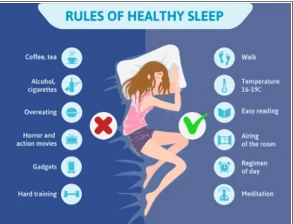Yes, you do lose weight when sleeping. However, water loss via breathing and sweating accounts for the majority of this. Though people do not burn much fat while sleeping, sleep is an essential part of one’s overall well-being. Not getting enough sleep can make it difficult to maintain a healthy weight.
Sleep deprivation can restrict fat loss and hamper the process of weight loss, especially while on a low-calorie diet. According to Dr. Harsh Sheth, one of the best weight loss surgeons in Mumbai, the quality and duration of your sleep may influence your body’s ability to regulate its weight.
How does sleep deprivation affect weight loss?
Many biological functions, including appetite, are affected by sleep disruption.
A link has been discovered between chronic sleep deprivation and a higher body mass index (BMI), which is a measurement of your weight compared to your height, in several population-based types of research.
According to a 2017 study, persons who had their sleeping cycles disrupted had higher appetites and ate more calorie-rich meals than those with a good sleep cycle. This research implies that modifying a person’s sleep schedule may impact their weight management.

Many biological functions, including appetite, are affected by sleep disruption.
A link has been discovered between chronic sleep deprivation and a higher body mass index (BMI), which is a measurement of your weight compared to your height, in several population-based types of research.
According to a 2017 study, persons who had their sleeping cycles disrupted had higher appetites and ate more calorie-rich meals than those with a good sleep cycle. This research implies that modifying a person’s sleep schedule may impact their weight management.
How does your brain react to less sleep?
When you are tired, the reward regions in your brain fire up in search of something pleasurable. So, while you may be able to control your comfort food desires when you are well-rested, your tired and foggy brain may struggle to say no to the second slice of cake.

In a study conducted at the University of Chicago, late-night snacking rose when participants were deprived of sleep and preferred to eat high-carb foods. Sleep-deprived individuals picked snacks with double the fat as those with at least 8 hours of sleep.
A second study discovered that not getting enough sleep causes people to consume larger amounts of all foods, leading to weight increase. According to studies, sleep deprivation has been linked to increased appetites for energy-dense, high-carbohydrate diets.
Dr. Harsh Sheth points out that when you have an exhausted brain, you get cravings for junk food while simultaneously lacking the willpower to say no. Eventually, they will contribute to other health risks.
What are the risk factors?
Sleep deprivation can raise the risk of metabolic syndrome, a condition in which several factors occur at the same time. This increases the chances of developing diabetes, cardiovascular diseases, and strokes.

These are some of the risk factors:
· Fatty tissue in the abdomen area
· Decreased levels of high-density lipoprotein, or “good” cholesterol
· Triglyceride levels that are too high increase the risk of heart disease
· Elevated blood sugar levels
· High blood pressure
How can I maintain a healthy sleep cycle?

Developing a healthy nighttime practice can help you achieve your long-term slimming objectives.
Setting a timetable, developing a soothing evening ritual, and having a peaceful environment can help you sleep better.
- Set a schedule
Maintaining a sleep schedule might be challenging due to the constant flooding of information and activities and the pressure to be productive.

However, keeping to a nighttime schedule, including weekends, maybe a simple and reliable method to improve the quality of your sleep.
- Use relaxing methods
Even if you try to go to bed on time every night, falling asleep could be a difficulty in itself. If you have trouble relaxing before bed, try creating a nighttime ritual that incorporates one or more of these approaches to help you relax and prepare your brain for sleep.
· Meditate
· Sip some chamomile tea
· Listen to pleasant and relaxing music
· Try deep breathing techniques
· Use essential oils or aromatherapy
- Dim or turn off the lights
Melatonin is a hormone that tells your body when to sleep and helps regulate sleep-wake cycles.
Dimming the lights of your bedroom an hour before you go to bed can help your body prepare for sleep and support melatonin production.
Smartphones, televisions, and computer monitors all contribute considerably to blue light exposure, so try to avoid using them before bedtime. Instead, you can unwind by reading a good book or listening to a soothing podcast.
- Keep the room temperature low
Your bedroom temperature may also impact how well you sleep.
When it is time to sleep, your body temperature drops, and it increases when it is time to wake up. It may be challenging for your body to reach the sleep phase if your room is excessively warm, making it more difficult to sleep or fall asleep.

According to several studies, the recommended room temperature for sleeping is 66–70°F (19–21°C). If possible, turn down the temperature in your bedroom a few degrees to improve your sleep quality.
Conclusion
According to certain popular weight loss programs, you can lose some weight while sleeping. However, the majority of what you shed when sleeping is water weight.
A person needs to maintain a balanced weight to reduce the incidence of health risk factors. To avoid the beginning of more severe illnesses such as heart disease, it is critical that you get enough sleep and eat a balanced diet.

Use your sleeping habits to help you lose weight in a healthy and long-term way. Dr. Harsh Sheth, a highly skilled weight loss surgeon in Mumbai, advises that getting adequate sleep is as essential as food and exercise for your health, well-being, and weight.
Don’t hesitate to contact Dr. Harsh Sheth to help you with your sleep and weight issues. He is passionate about the medical sciences and keeps up to date with the latest technologies to improve the quality of life of his patients.

